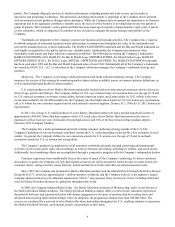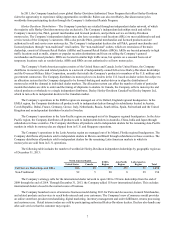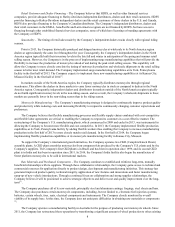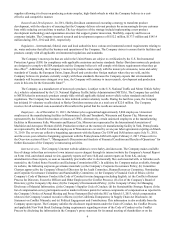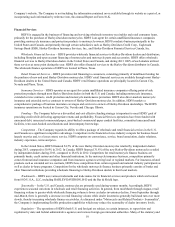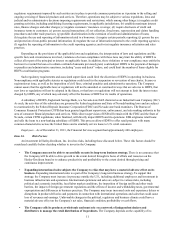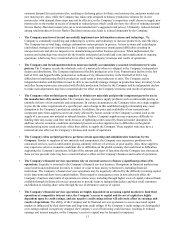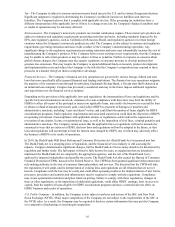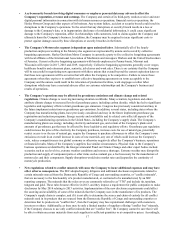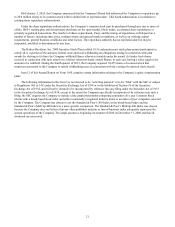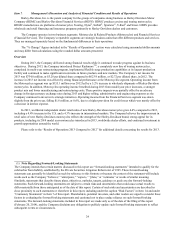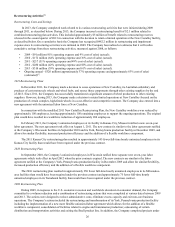Harley Davidson 2013 Annual Report Download - page 16
Download and view the complete annual report
Please find page 16 of the 2013 Harley Davidson annual report below. You can navigate through the pages in the report by either clicking on the pages listed below, or by using the keyword search tool below to find specific information within the annual report.16
Tax - The Company is subject to income and non-income based taxes in the U.S. and in various foreign jurisdictions.
Significant judgment is required in determining the Company's worldwide income tax liabilities and other tax
liabilities. The Company believes that it complies with applicable tax law. If the governing tax authorities have a
different interpretation of the applicable law or if there is a change in tax law, the Company's financial condition and/
or results of operations may be adversely affected.
Environmental - The Company’s motorcycle products use internal combustion engines. These motorcycle products are
subject to statutory and regulatory requirements governing emissions and noise, including standards imposed by the
EPA, state regulatory agencies, such as California Air Resources Board, and regulatory agencies in certain foreign
countries where the Company’s motorcycle products are sold. The Company is also subject to statutory and regulatory
requirements governing emissions and noise in the conduct of the Company’s manufacturing operations. Any
significant change to the regulatory requirements governing emissions and noise may substantially increase the cost of
manufacturing the Company’s products. If the Company fails to meet existing or new requirements, then the Company
may be unable to sell certain products or may be subject to fines or penalties. Further, in response to concerns about
global climate changes, the Company may face greater regulatory or customer pressure to develop products that
generate less emissions. This may require the Company to spend additional funds on research, product development,
and implementation costs and subject the Company to the risk that the Company’s competitors may respond to these
pressures in a manner that gives them a competitive advantage.
Financial Services - The Company’s financial services operations are governed by various foreign, federal and state
laws that more specifically affect general financial and lending institutions. The financial services operations originate
the majority of its consumer loans through its subsidiary, Eaglemark Savings Bank, a Nevada state thrift chartered as
an industrial loan company. Congress has previously considered and may in the future impose additional regulation
and supervision over the financial services industry.
Depending on the provisions of the applicable laws and regulations, the interpretation of laws and regulations and the
specific facts and circumstances involved, violations of or non-compliance with these laws may limit the ability of
HDFS to collect all or part of the principal or interest on applicable loans, may entitle the borrower to rescind the loan
or obtain a refund of amounts previously paid, could subject HDFS to payment of damages or penalties and
administrative sanctions, including "cease and desist" orders, and could limit the number of loans eligible for HDFS
securitizations programs. Such regulatory requirements and associated supervision could limit the discretion of HDFS
in operating its business. Noncompliance with applicable statutes or regulations could result in the suspension or
revocation of any charter, license or registration at issue, as well as the imposition of civil fines, criminal penalties and
administrative sanctions. The Company cannot assure that the applicable laws or regulations will not be amended or
construed in ways that are adverse to HDFS, that new laws and regulations will not be adopted in the future, or that
laws and regulations will not attempt to limit the interest rates charged by HDFS, any of which may adversely affect
the business of HDFS or its results of operations.
In 2010, the Dodd-Frank Wall Street Reform and Consumer Protection Act (Dodd-Frank Act) was passed into law.
The Dodd-Frank Act is a sweeping piece of legislation, and the financial services industry is still assessing the
impacts. Congress detailed some significant changes, but the Dodd-Frank Act leaves many details to be determined by
regulation and further study. The full impact will not be fully known for years, as regulations that are intended to
implement the Dodd-Frank Act are adopted by the appropriate agencies, and the text of the Dodd-Frank Act is
analyzed by impacted stakeholders and possibly the courts. The Dodd-Frank Act also created the Bureau of Consumer
Financial Protection (CFPB), housed in the Federal Reserve. The CFPB has been granted significant enforcement and
rule-making authority in the area of consumer financial products and services. The direction that the CFPB will take,
the regulations it will adopt, and its interpretation of existing laws and regulations are all elements that are not yet
known. Compliance with the law may be costly and could affect operating results as the implementation of new forms,
processes, procedures and controls and infrastructure may be required to comply with the regulations. Compliance
may create operational constraints and place limits on pricing. Failure to comply with these regulations, changes in
these or other regulations, or the imposition of additional regulations, could affect HDFS’ earnings, limit its access to
capital, limit the number of loans eligible for HDFS securitization programs and have a material adverse effect on
HDFS’ business and results of operations.
U.S. Public Company - In addition, the Company is also subject to policies and actions of the SEC and New York
Stock Exchange (NYSE). Many major competitors of the Company are not subject to the requirements of the SEC or
the NYSE rules. As a result, the Company may be required to disclose certain information that may put the Company
at a competitive disadvantage to its principal competitors.


